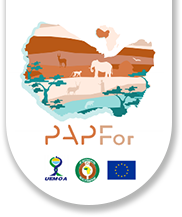Home / Guinean forests / Threats / Deforestation for agriculture / Agriculture for agro-industry / Palm oil
Palm oil
Palm oil is a vegetable oil extracted by hot-pressing the pulp of the oil palm fruit, a tree native to tropical Africa from which palm kernel oil is also extracted.
Originally from West Africa, the oil palm (Elaeis guineensis) is now cultivated in all tropical regions.
Palm oil supports tens of millions of people worldwide, the majority of whom are small-scale producers. A traditional ingredient in the kitchens of Africa, South America and Asia, it is now used massively in non-producing countries in the manufacture of processed foods, replacing animal fats and other vegetable oils in crisps, croutons, freeze-dried soups, spreads, biscuits, baby milk, tinned sardines, stock cubes, mayonnaise, tomato sauce, cereals, chocolate, ice cream, grated cheese, sauces, fresh creams, pastries, ready meals, ready-made sauces, rusks, buns, sweet and savoury biscuits, etc. It is also used in many cosmetic products, for example soaps, perfumes, or as a moisturising agent in creams. In other industries it is used as a lubricant or agrofuel.
Growing production ...
Indonesia and Malaysia are now the world’s leading palm oil producing countries, accounting for over 85% of production between them.
However, the Guinean forest countries also rank highly among global producers, with Nigeria, Côte d’Ivoire, Cameroon and Ghana being the largest African producers.
| World rank | State | 1965 | 1980 | 2000 | 2020 |
| 5 | Nigeria | 517 | 520 | 730 | 1,280 |
| 11 | Côte d’Ivoire | 15 | 147 | 248 | 515 |
| 12 | Cameroon | 39 | 93 | 136 | 465 |
| 13 | Ghana | 14 | 19 | 108 | 365 |
| 20 | Sierra Leone | 40 | 50 | 36 | 75 |
| 24 | Guinea | 13 | 40 | 50 | 50 |
| 25 | Liberia | 16 | 28 | 42 | 45 |
Ranking of states by palm oil production - Source: Index Mundi - Adapted from https://www.indexmundi.com/agriculture/?commodity=palm-oil&graph=production
The global need for vegetable oils is booming. They are now the fastest growing commercial commodity, and demand is expected to double by 2050 compared to 2008.
Oil palm is mainly grown commercially as a monoculture, or it can be part of an agroforestry system. When it replaces tropical forest, there are significant negative impacts for biodiversity. Analyses indicate that in West Africa, oil palm is responsible for 2-3% of forest loss between 1972 and 2015.
Monoculture oil palm plantations will play a considerable part in meeting the global demand for vegetable oils; palms produce oil more efficiently than any other crop (with an estimated global average yield of 3.5-4.0 tonnes of palm oil and a potential 11-18 tonnes of fresh fruit per hectare).
More responsible production initiatives
The Roundtable for Sustainable Palm Oil (RSPO) is a non-profit association that brings together stakeholders from seven sectors of the palm oil industry: producers, food companies or distributors, consumer goods manufacturers, retailers, banks and investors, environmental and conservation NGOs, and development or social NGOs. Its aim is to develop and implement global standards for sustainable palm oil.
In particular, the RSPO label certifies that the oil’s production has met a number of criteria. These include, among others, ethical and transparent behaviour, respect for communities and human rights, respect for workers’ rights and conditions, protection and conservation of the environment, support for the inclusion of small-scale producers, optimisation of productivity, efficiency, positive impacts and resilience, etc. The label is however criticised by some for allowing producers to certify themselves.
For more information: https://www.rspo.org/; https://www.pronatura.ch/fr/2018/huile-de-palme-durable-de-la-poudre-aux-yeux-labellisee-rspo


